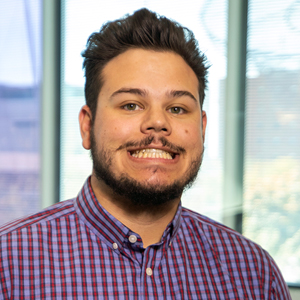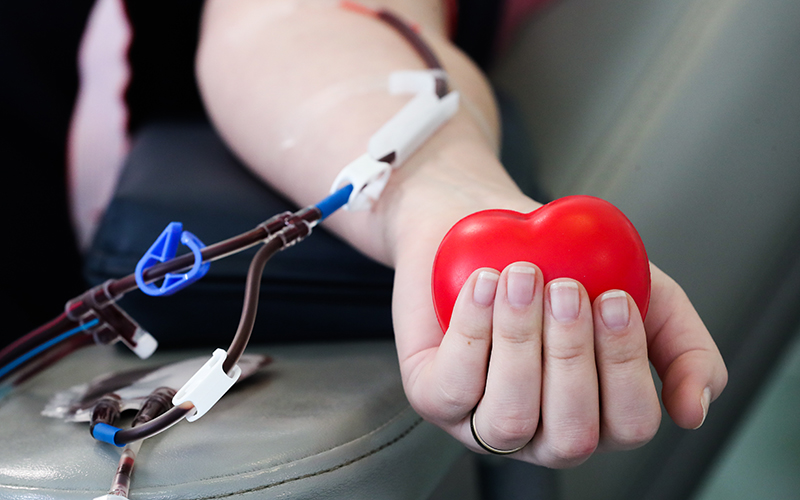GLENDALE – Michael Bidwill’s Tuesday morning wasn’t about the upcoming NFL Draft or sharing his excitement over the team acquiring wide receiver DeAndre Hopkins.
It was about blood.
Bidwill was included among the 500-plus people who donated blood Tuesday at State Farm Stadium during a Cardinals blood drive with partners Dignity Health and Cigna.
Due to the impact of the COVID-19 outbreak that has led to the cancellation of events and gatherings, including community relations events the Cardinals had planned, Bidwill wanted to make a difference in some way.
“I asked our community relations people to reach out to blood services organizations to see if we could do events that we could use the space of the 1.7 million square feet at State Farm Stadium,” Bidwill said. “That way, we could spread out and be physically distant, so we could do something that was massive and do it safely with their online reservation system.”
The Cardinals organization will hold blood drives at State Farm Stadium on April 7 and 8 because Tuesday’s event filled up so quickly through the reservation system. Those events will be sponsored by Anheuser-Busch in partnership with the American Red Cross. Reservations for both of the additional events filled those up within 14 hours, the Cardinals reported.
Bidwill said those who were unable to sign up for the Cardinal-hosted blood drives can still donate by signing up at Vitalant’s bloodhero.com or at redcrossblood.org.
Around the world, large public venues such as New York City’s Central Park have become places for COVID-19 patients to receive care or treatment. Bidwill was asked if there had been discussions with Arizona Gov. Doug Ducey about using State Farm Stadium as a pop-up treatment center, if needed
“Today we’re obviously using it for a blood drive,” Bidwill said. “As I understand through Gov. Ducey’s office, (the U.S.) Army Corp of Engineers are involved, they’re looking at a number of different facilities. I can tell you we’re going to continue to use State Farm Stadium for things that will benefit the community.”
The Cardinals donated $1 million to Ducey’s Arizona Coronavirus Relief Fund on March 24. The Arizona Coyotes announced on Tuesday that team President and CEO Ahron Cohen and President of Hockey Operations and General Manager John Chayka that they will donate 20% of their salaries over the coming months to support the Arizona Coronavirus Relief Fund.
“Arizona has been our team’s home for nearly 25 years and this community has rallied around the Coyotes in good times and bad,” said Cohen in a statement released by the organization. “In a moment of such critical need, my wife Dana and I feel compelled to do what we can as a family to help our Arizona family. As a business leader, a husband, a father and an Arizonan, I see this as our privilege and responsibility to help support the people of this great State. I know we will make it through this challenge as a result of all of us Arizonans rallying together.”
Bidwill said the teams donation has several objectives.
“It’s going to focus on three things,” he said. “Personal protective equipment for our medical providers; supporting non-profit organizations that impact the most vulnerable people, the homeless, food banks, domestic shelters and those types of shelters, and lastly, getting computers and technology to low-income students. Those three things are really important and I know that fund is gaining momentum. I think it’s important that those that can give, give to those funds and support them. It’s going to be a marathon, not a sprint.”
The Cardinal organization is also doing its part in social distancing. With the NFL Draft still expected to go forward, but likely to be conducted remotely, Bidwill has put an emphasis on everyone in the organization doing their part for the community and keeping themselves healthy as well.
“The number one thing, something I’ve really focused on with (General Manager) Steve (Keim), (Cardinals coach) Kliff (Kingsbury) and everyone else is it’s really important that we all take care of ourselves,” Bidwill said. “Stay at home, stay safe over the next few weeks. The worst thing that could happen is if one of us has to isolate or gets very sick as we’re approaching the draft. That would be tough for us to deal with. It’s important for us, the decision makers, to stay healthy over the next couple of weeks.”

